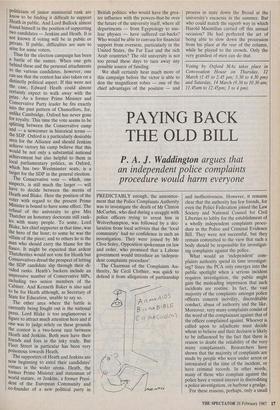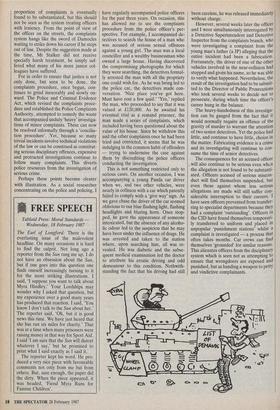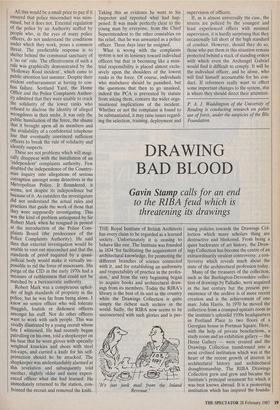PAYING BACK THE OLD BILL
P. A. J. Waddington argues that
an independent police complaints procedure would harm everyone
PREDICTABLY enough, the announce- ment that the Police Complaints Authority was to investigate the death of Mr Clinton McCurbin, who died during a struggle with police officers trying to arrest him in Wolverhampton, was followed by a dec- laration from local activists that the 'local community' had no confidence in such an investigation. They were joined by Mr Clive Soley, Opposition spokesman on law and order, who promised that a Labour government would introduce an 'indepen- dent complaints procedure'.
The Chairman of the Complaints Au- thority, Sir Cecil Clothier, was quick to defend it from allegations of partisanship and ineffectiveness. However, it remains clear that the authority has few friends, for even the Police Federation joined the Law Society and National Council for Civil Liberties to lobby for the establishment of a wholly independent complaints proce- dure in the Police and Criminal Evidence Bill. They were not successful, but they remain committed to the view that such a body should be responsible for investigat- ing complaints against the police. What would an 'independent' com- plaints authority spend its time investigat- ing? Since the PCA only emerges into the public spotlight when a serious incident requires investigation, the public might gain the misleading impression that such incidents are routine. In fact, the vast majority of the complaints amongst police officers concern incivility, discreditable conduct, abuse of authority and the like. Moreover, very many complaints consist of the word of the complainant against that of the officer complained against. Whoever is called upon to adjudicate must decide whom to believe and their decision is likely to be influenced by the fact that there is reason to doubt the reliability of the very many complainants. Researchers have shown that the majority of complaints are made by people who were under arrest or intoxicated at the time of the incident, or have criminal records. In other words, many of those who complain against the police have a vested interest in discrediting a police investigation, or harbour a grudge. For these reasons, perhaps, only a small proportion of complaints is eventually found to be substantiated, but this should not be seen as the system treating officers with leniency. From the point of view of the officer on the streets, the complaints system hangs like the sword of Damocles waiting to strike down his career if he steps out of line. Despite the suggestion made at the time, Mr Stalker did not receive specially harsh treatment, he simply suf- fered what many of his more junior col- leagues have suffered.
For in order to ensure that justice is not only done, but seen to be done, the complaints procedure, once begun, con- tinues to grind inexorably and slowly on- ward. The Police and Criminal Evidence Act, which revised the complaints proce- dure and established the Police Complaints Authority, attempted to remedy the waste that accompanied unduly 'heavy' investiga- tions of minor complaints. These can now be resolved informally through a `concilia- tion procedure'. Yet, because so many trivial incidents involve technical violations of the law or can be construed as constitut- ing serious disciplinary offences, expensive and protracted investigations continue to follow many complaints. This diverts police resources from the investigation of serious crime.
Perhaps these points become clearer with illustration. As a social researcher concentrating on the police and policing, I have regularly accompanied police officers for the past three years. On occasion, this has allowed me to see the complaints procedure from the police officer's per- spective. For example, I accompanied de- tectives to search the house of a man who was accused of serious sexual offences against a young girl. The man was a local councillor and a wealthy businessman who owned a large house. Having discovered the compromising photographs for which they were searching, the detectives formal- ly arrested the man with all the propriety one could wish for. As he was being led to the police car, the detectives made con- versation. 'Nice place you've got here. Must have cost a few quid.' Yes,' replied the man, who proceeded to say that it was valued at £120,000. As he awaited his eventual trial as a remand prisoner, the man made a series of complaints, which included having been questioned about the value of his house. Since he withdrew this and the other complaints once he had been tried and convicted, it seems that he was indulging in the common habit of offenders — trying to undermine the case against them by discrediting the police officers conducting the investigation.
This is not something restricted only to serious cases. On another occasion, I was accompanying a young Panda car driver when we, and two other vehicles, were nearly in collision with a car which patently failed to comply with a `give way' sign. As we gave chase the driver of the car seemed oblivious to our blue flashing light, flashing headlights and blaring horn. Once stop- ped, he gave the appearance of someone intoxicated, but the absence of any alcoho- lic odour led to the suspicion that he may have been under the influence of drugs. He was arrested and taken to the station where, upon searching him, all was re- vealed. He was diabetic and the subse- quent medical examination led the doctor to attribute his erratic driving and odd demeanour to this condition. Nothwith- standing the fact that his driving had still been careless, he was released immediately without charge.
However, several weeks later the officer and I were simultaneously interrogated by a Detective Superintendent and Detective Inspector from the complaints branch, who were investigating a complaint from the young man's father (a JP) alleging that the entire incident had been a fabrication. Fortunately, the driver of one of the other vehicles involved in the near-collision had stopped and given his name, so he was able to verify what happened. Nevertheless, the result of the investigation had to be submit- ted to the Director of Public Prosecutions who took several weeks to decide not to prosecute, during which time the officer's career hung in the balance.
The heavy-handedness of this investiga- tion can be gauged from the fact that it would normally require an offence of the gravity of murder to warrant the attention of two senior detectives. Yet the police had little, and continue to have little, choice in the matter. Fabricating evidence is a crime and its investigating will continue to con- sume the time of senior detectives.
The consequences for an accused officer , will also continue to be serious even wlu.n the allegation is not found to be substanti- ated. Officers accused of serious miscon- duct will find themselves suspended, but even those against whom less serious allegations are made will still suffer con- siderable interruption to their careers. I have seen officers prevented from transfer- ring to specialist departments because they had a complaint 'outstanding'. Officers in the CID have found themselves temporari- ly transferred to uniform and placed in unpopular `punishment stations' whilst a complaint is investigated — a process that often takes months. Car crews can find themselves 'grounded' for similar reasons. This alienates officers from the disciplinary system which is seen not as attempting to ensure that wrongdoers are exposed and punished, but as handing a weapon to petty and vindictive complainants. All this would be a small price to pay if it ensured that police misconduct was mini- mised, but it does not. External regulation of the police by an Authority staffed by people who, in the eyes of many police officers, do not understand the conditions under which they work, poses a common threat. The predictable response is to shelter behind the communal sanctuary of a 'no rat' rule. The effectiveness of such a rule was graphically demonstrated by the `Holloway Road incident', which came to public attention last summer. Despite their evident embarrassment at having to con- fess failure. Scotland Yard, the Home Office and the Police Complaints Author- ity admitted that they were unable to crack the solidarity of the lower ranks who refused to disclose the identity of alleged wrongdoers in their midst. It was only the public humiliation of the force, the shame that it brought upon all its members and the availability of a confidential telephone line that eventually convinced sufficient officers to break the rule of solidarity and identify suspects. These are not problems which will magi- cally disappear with the installation of an `independent' complaints authority. Few doubted the independence of the Country- man inquiry into allegations of serious corruption amongst some detectives in the Metropolitan Police. It floundered, it seems, not despite its independence but because of it. As outsiders the investigators did not understand the actual rules and practices that guide the work of those that they were supposedly investigating. This was the kind of problem anticipated by Sir Robert Mark when he resigned in protest at the introduction of the Police Com- plaints Board (the predecessor of the Police Complaints Authority). He said then that external investigation would be unable to root out misconduct and that the standards of proof required by a quasi- judicial body would make it virtually im- possible to rid the force of miscreants. His purge of the CID in the early 1970s had a measure of ruthlessness that could not be matched by a bureaucratic authority.
Robert Mark was a conspicuous uphol- der of high standards of propriety in the police, but he was far from being alone. I know no senior officer who will tolerate thuggish, loutish or dishonest officers amongst his staff. Nor do other officers want to work with such people. This was vividly illustrated by a young recruit whose fate I witnessed. He had recently begun patrolling on his own, told a shopkeeper on his beat that he wore gloves with specially weighted knuckles and shoes with steel toe-caps, and carried a knife for his self- protection should he be attacked. The shopkeeper was understandably alarmed at this revelation and subsequently told another, slightly older and more experi- enced officer what she had learned. He immediately returned to the station, con- fronted the recruit and removed the knife. Taking this as evidence he went to his Inspector and reported what had hap- pened. It was made perfectly clear to the young man by everyone, from the Chief Superintendent to the other constables on his relief, that he was unwanted as a police officer. Three days later he resigned.
What is wrong with the complaints system is not its leniency toward individual officers but that in becoming like a mini- trial responsibility is placed almost exclu- sively upon the shoulders of the lowest ranks in the force. Of course, individuals who misbehave should be punished, but the questions that then to go unasked, indeed the PCA is prevented by statute from asking them, concern the wider orga- nisational implications of the incident. Whether or not the complaint is found to be substantiated, it may raise issues regard- ing the selection, training, deployment and supervision of officers.
If, as is almost universally the case, the streets are policed by the youngest and least experienced officer with minimal supervision, it is hardly surprising that they occasionally fall short of the high standard of conduct. However, should they do so, those who put them in this situation remain protected behind a stack of standing orders with which even the Archangel Gabriel would find it difficult to comply. It will be the individual officer, and he alone, who will find himself accountable for his con- duct. If reformers really want to effect some important changes to the system, this is where they should direct their attention.
P. A. J. Waddington of the University of Reading is conducting research on police use of force, under the auspicies of the Blic Foundation.




















































 Previous page
Previous page